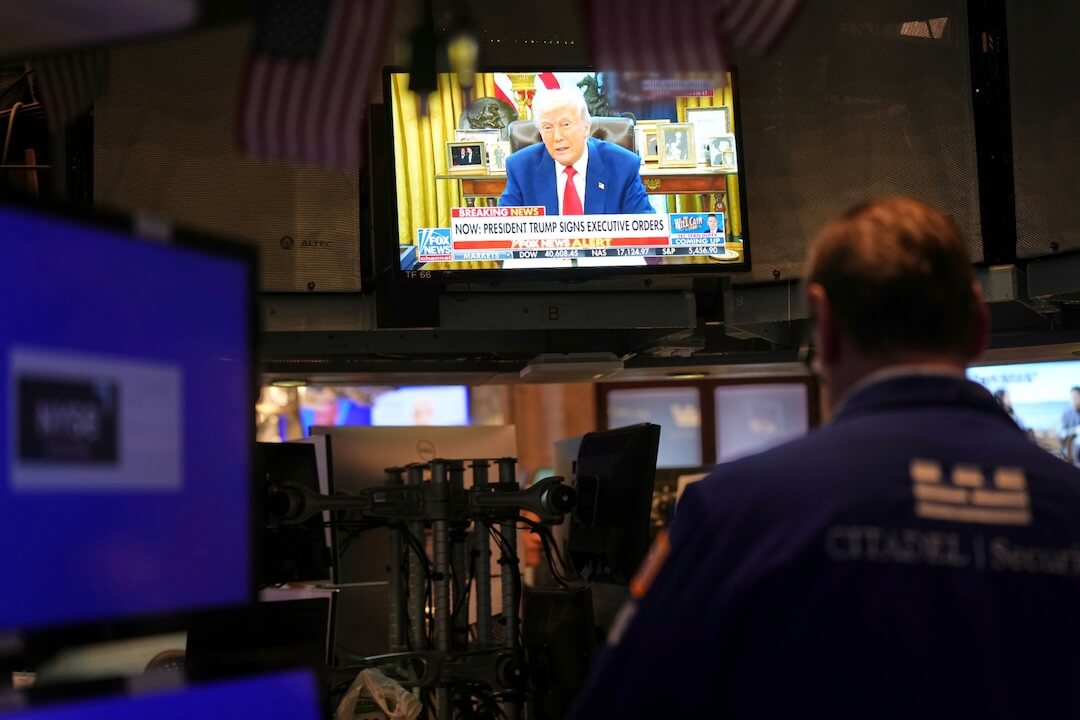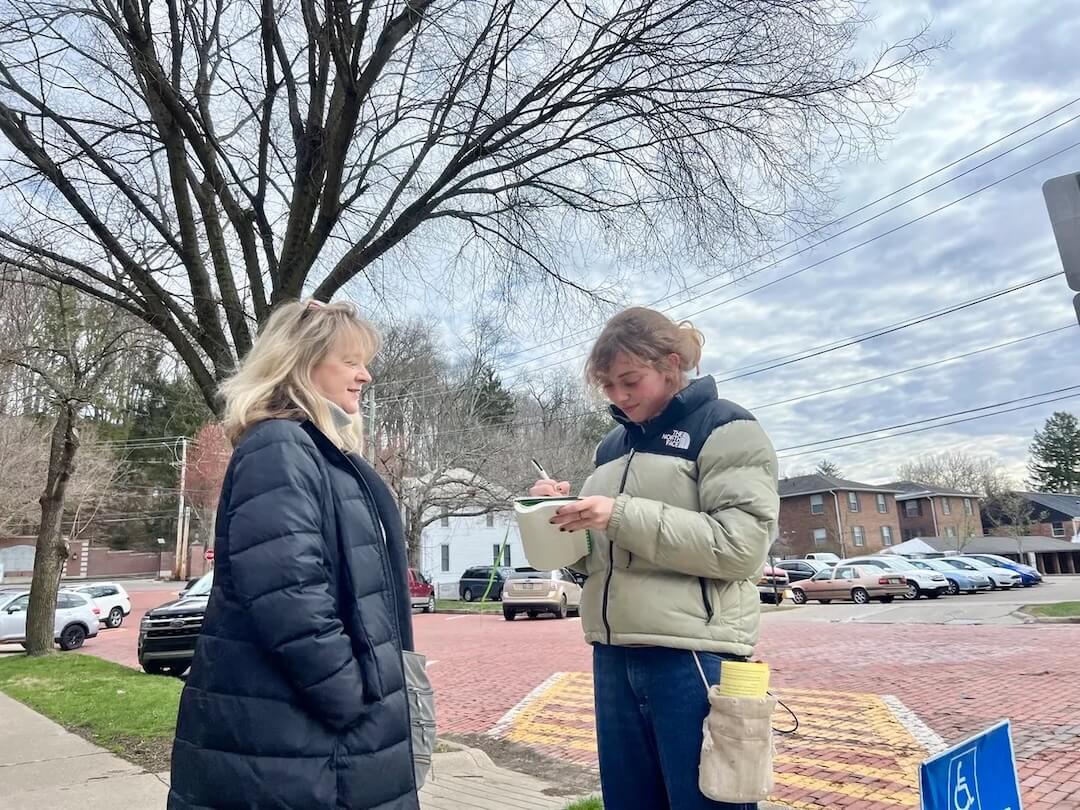This case study is part of Resilience Reports, a series from the European Journalism Centre about how news organizations across Europe are adjusting their daily operations and business strategies as a result of the COVID-19 crisis.
In a nutshell: Koncentrat developed a TV show that aired online and on regional television stations to help inform students about key media literacy concepts.
When Denmark’s schools closed in March as a precaution against the coronavirus, teachers scrambled to come up with remote teaching materials for their students. For Danish news startup Koncentrat, this presented a perfect opportunity to expose its archive of news articles and didactic materials and help teachers build lesson plans around the topics of media literacy and current affairs.
In addition to opening up its content to non-subscribers and continuing its successful “youth correspondents” network, the team created a daily 35-minute educational program that aired on YouTube, Facebook and Danish regional television. The show’s success means Koncentrat now expects to double the number of schools subscribing to its content over the next 12 months.
Here, Tara Kelly of the European Journalism Centre explains how the Copenhagen-based news startup conceived and filmed the show while adhering to strict social distancing rules.
What is Koncentrat?
Founded in 2017, Koncentrat is a Danish news media startup designed to help young people think critically about important and newsworthy topics. Aimed at 13-to-17-year-olds, it was founded as a collaboration between journalists and specialists in didactics (the theory of teaching). Journalists write explanatory news articles about current affairs, and teachers create assignments to be used in school lessons alongside these articles.
All students and teachers in the Danish education system use a digital ID system — called UNI-login — to access educational services and teaching materials. Koncentrat sells subscription packages to schools and regional education authorities across Denmark and makes its teaching materials available via UNI-login. The downside of this approach is that organizations from outside the education sector cannot purchase or access its content.
Koncentrat has five full-time staff: its three co-founders, a part-time didactic editor and an illustrator, as well as five regular freelancers. Two-thirds of the team work on editorial content published on its website while a third help create teaching materials available via the online portal.
Boosting media literacy and building democratic self-confidence among young people is core to Koncentat’s mission. However, using media to achieve this is not straightforward. According to a Reuters Institute 2019 report, young people have less brand loyalty and prefer multiple news sources, which makes catering for their needs difficult. A 2017 report by the Knight Foundation cited research that showed teens and young people have low levels of media trust, while the Danish Broadcasting Corporation found that this group uses media to nurture personal relationships rather than out of any affinity to a particular outlet.
Koncentrat’s main source of revenue comes from school subscriptions, which cost €95 a year per class. As part of this offering, the team publishes three to four articles each week and sends out a newsletter with recently published articles and a teaching guide for incorporating articles in lesson plans. The newsletter also highlights upcoming topics to help prepare teachers for the coming weeks.
More than 20,000 students currently have access to Koncentrat’s content through their school. Other revenue sources include workshops in schools as well as some support from foundations to specific projects.
In 2018, Koncentrat was provided a grant as part of the Engaged Journalism Accelerator, which it used to create and train a network of “youth correspondents” across Denmark. During the program, 22 correspondents were paired with a Koncentrat journalist to conduct interviews, write a story and take photos and videos. The network is growing and still active; a 16-year-old youth correspondent called Liv recently wrote a piece about a new generation of small nuclear power reactors because she found the topic interesting in relation to combating climate change.
How did Koncentrat handle the COVID-19 crisis?
Following the closure of schools in March due to the coronavirus, Koncentrat set up a free daily explanatory TV news program called Sofa News designed to strengthen media literacy amongst quarantined teens. It was broadcast live on YouTube and all eight Danish regional TV2 stations at 10 a.m. every weekday.
Guests — including war correspondents and media experts — were invited to talk about their experiences and joined via video call to limit the spread of the virus. Other segments focused on copyright usage for press photos and how to obtain sources. The program lasted for 35 minutes, during which the audience could engage with the guests via social media. Afterward, viewers could read complementary news articles online about the topics covered in the show.
Three of Koncentrat’s staff worked on producing the TV show and two people worked on writing the complementary stories and weekly updates on key COVID-19 developments. Koncentrat’s publishing partner, Alinea, covered the expenses for a studio and a film crew to film the show. Over six weeks, the team produced 25 episodes, which each received between 600-1,200 views on YouTube.
Koncentrat worked with its network of youth correspondents during lockdown to publish four articles specifically about COVID-19. For example, it wrote about how the spread of the virus could be limited and how COVID-19 might affect the U.S. presidential election in November. Other stories looked at the effect of the pandemic on young people in Denmark.
The format of these contributions was atypical as the youth correspondents documented their personal experiences in a diary-like format rather than a traditional story. Other coronavirus-related topics covered by the Koncentrat team included young people as possible vectors for the spread of the coronavirus and how the lockdown would impact the economy.
During March, April and May, Koncentrat experienced a tenfold increase in traffic compared to the previous three months. The team believes this happened for several reasons. First, the closure of schools meant that the demand for digital teaching materials increased dramatically.
Second, the broadcast of Sofa News on terrestrial television allowed Koncentrat to tap into an audience that it hadn’t encountered before. For example, it reached more TV viewers in the southern parts of Jutland, far from its offices in Copenhagen and somewhere it had struggled to reach previously. The removal of the paywall during this time also drove visitors.
The spike in usage was also partly driven by the Danish government’s response to COVID-19. Koncentrat’s target audience — children aged 12 and above — were not permitted to return until May 18, which helps to explain high traffic levels in April and May. Elementary schools, on the other hand, were pushed to reopen quickly because Denmark has the greatest percentage of working mothers among developed nations, according to figures from the Organization for Economic Co-operation and Development. It closed schools on March 12 but, just over a month later, was allowing under 12s to return to the classroom.
How will COVID-19 crisis change the future of Koncentrat?
The pandemic forced Koncentrat to make the leap into interactive broadcast journalism, which was something none of the team had any prior experience in. It allowed people to try their hand at producing and anchoring as well as using live response and polling technologies such as Mentimeter.
There are no plans to do this permanently in the future, but the team has discussed doing one-off specials for particular events. For instance, they are already planning a smaller post-lockdown version of Sofa News in connection with a national newspaper writing competition that it runs for school children every September.
Koncentrat has yet to see how the pandemic will affect the 10% of schools in Denmark that currently subscribe to its product. Schools renew annually and the team does not know how government budgets may be stretched. Despite the uncertainty, Koncentrat forecasts its readership will double as a result of the exposure brought about by Sofa News.
COVID-19 has affected Koncentrat’s revenue by preventing the team from completing scheduled workshops in the spring and the summer. It had to forfeit around €6,000, which is roughly a quarter of what it earns annually from workshops. It hasn’t yet been able to fill this gap.
Danish schools are now out for summer holidays. Koncentrat does not expect to see the high number of visitors continue over the summer months. Children will return to schools in August, at which point it remains to be seen whether teachers will continue to use Koncentrat resources as part of their lessons.
What have they learned so far?

Lasse Wamsler (Courtesy: Koncentrat)
“The crisis forced us to understand how the pandemic posed specific questions and challenges for young people’s lives. This meant the pandemic became a prism for us to look through to learn about the hopes and fears of our readership. It also forced us to be more agile and creative as the circumstances required it. These are all lessons that we will carry with us in our work to produce unique and relevant stories in the future.”
– Lasse Wamsler, editor-in-chief, Koncentrat
This case study was produced with support from Evens Foundation. It was originally published by the European Journalism Centre on Medium and is published here under the Creative Commons Attribution-NonCommercial-ShareAlike 2.0 license. The Poynter Institute is also the fiscal sponsor of the Verification Handbook.






